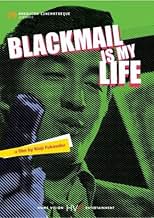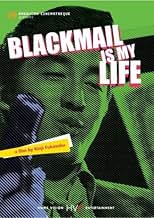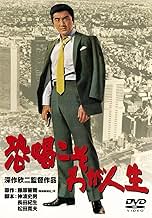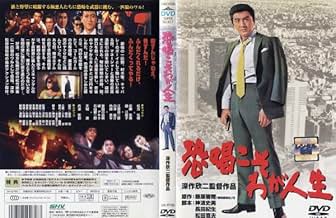A pungent, extremely entertaining tale of hedonistic, amoral blackmailer Matsukata.A pungent, extremely entertaining tale of hedonistic, amoral blackmailer Matsukata.A pungent, extremely entertaining tale of hedonistic, amoral blackmailer Matsukata.
Featured reviews
The story involves four people whose work is blackmail. They're successful in their "business," but their eyes eventually get too big for their stomachs when they think they've found a way to rip off the yakuza. The job proves harder than the easy money it initially seemed. While it is generally well done, its techniques reminded me a little too much of the annoying modern style with a lot of unnecessary freeze frames, chronological jumps, and shifts from black and white to color. I also felt that the characters ought to have been more well developed; the story is good, but the style overwhelms possible substance. My favorite part of the film is the fact that the characters whistle the theme tune to Suzuki Seijun's Tokyo Drifter, which means that Suzuki had to have had some popularity if his work was quoted like this. 7/10.
I noticed that IMDb lists this as a crime film AND a comedy. Well, there's nothing funny about the film--it's not at all a comedy. Instead, the film is about four low-lifes who make a career out of blackmailing people and fighting various mobs (who SHOULD have been able to smash them like bugs but somehow didn't throughout much of the film). For them, it all seems to be for the thrills and laughs--the money is secondary. However, the deeper the risk the greater the thrills--so they keep biting off more and more and more. You figure that eventually they'll get in way over their heads. And that is when their friend Zero (a black guy--which is quite unusual for a Japanese film) is killed, things look really bad for these bizarre anti-heroes.
While this film is quite different from the usual mobster film of the time, it still is a pretty ordinary crime drama. It was reasonably entertaining but no more. For those who like the genre, it's worth seeing--for others, probably not.
While this film is quite different from the usual mobster film of the time, it still is a pretty ordinary crime drama. It was reasonably entertaining but no more. For those who like the genre, it's worth seeing--for others, probably not.
Blackmail is My Life is one of four films that Fukasaku produced in that year and once again affirms not only his brilliant visual style but the incredible energy of the whole crew that worked with him. You have to see this film wide on a big screen to see how beautifully it is shot and composed. It moves fast but the visual strategies show Fukasaku's control over his world and produce a great viewing experience before you even have to delve into the brutal world of Japanese low lifes and the power of the political world that exists at the time. This film fits in comfortably with other films of the time from all over the globe where power and politics were being critiqued and examined from every angle and genre available.
Blackmail Is My Life (1968)
Well, the bad guys (four men and one woman, all young and good looking) have a lot of fun, and carry a lot of poise. As rank amateurs they are lucky and, between racing around in their car, show a lot of cool style. It's 1968 in Japan, and it feels like maybe 1964 in the U.S., with people still wearing suits and looking good doing it.
Eventually, they get in over their heads, but we don't really worry at first. They often say vague things like, "We'll go ahead with out plan," but they never say what they are planning. And then the plan happens, and it's fast and jazzy, in a kind of extended television way. The plot is kind of interesting, digging into the underworld of Japan in this sideways fashion. And visually it's fun, very nice wide screen compositions in a wide range of gritty Japanese locations. There is even a dramatic, spare electric guitar score, perfect for the period.
The more serious and deadly this movie gets, the more it loses it's lighthearted flaws. There is clearly (to me) an influence from Bonnie and Clyde (the previous year) with romanticizing bad guys and extended violence. There is some real poignancy built in, as well. There are lots of night scenes and dramatic lighting, and this has a late film noir kind of quality, somehow, dark and brooding between action scenes. If you don't mind some Japanese camp aspects, this might really make your night. And just a heads up: the second half is easier to like in a conventional way, even if the first half is more original and excessive.
Well, the bad guys (four men and one woman, all young and good looking) have a lot of fun, and carry a lot of poise. As rank amateurs they are lucky and, between racing around in their car, show a lot of cool style. It's 1968 in Japan, and it feels like maybe 1964 in the U.S., with people still wearing suits and looking good doing it.
Eventually, they get in over their heads, but we don't really worry at first. They often say vague things like, "We'll go ahead with out plan," but they never say what they are planning. And then the plan happens, and it's fast and jazzy, in a kind of extended television way. The plot is kind of interesting, digging into the underworld of Japan in this sideways fashion. And visually it's fun, very nice wide screen compositions in a wide range of gritty Japanese locations. There is even a dramatic, spare electric guitar score, perfect for the period.
The more serious and deadly this movie gets, the more it loses it's lighthearted flaws. There is clearly (to me) an influence from Bonnie and Clyde (the previous year) with romanticizing bad guys and extended violence. There is some real poignancy built in, as well. There are lots of night scenes and dramatic lighting, and this has a late film noir kind of quality, somehow, dark and brooding between action scenes. If you don't mind some Japanese camp aspects, this might really make your night. And just a heads up: the second half is easier to like in a conventional way, even if the first half is more original and excessive.
Blackmail is my Life came in a transitional period for Japanese crime cinema and it shows that by being somehow stylistically confused. The genre was with one foot still set on the earlier Nikkatsu pictures that portrayed yakuzas as people who operated with some sense of chivalry (and BIML reflects that by having the blackmailers act as the heroes), the cool of Seijun Suzuki who bid the genre adieu with Branded to Kill one year earlier (and what an adieu that was) and one foot looking at the future.
The first half of the picture resembles the colourful pop air of Suzuki and anticipates the disjointed timelines and narrative style of The Yakuza Papers. Hiroki Matsukata is Muraki; professional blackmailer and quite successful at that. He lies on a bed and remembers. Flashbacks show us his humble beginnings. They start in black and white then colour kicks in. Frames freeze while he narrates in a voice-over. We go back and forth like that until after the half hour mark the story starts to shape up. His rise as a prominent blackmailer is seen through a series of incidents that lead up to the big con.
The second half is predicated more on character than style. Fukasaku puts the quirky flashbacks, stills and narration of the beginning to the side and focuses on the story in a straight-forward manner. He's just as good this way. The movie turns more cynical and gritty and the ending is particularly memorable.
The director is still not at the top of his craft (it's relatively still early in his career) but he shows that he's not willing to settle down for a simple, run-of-the-mill yakuza flick. He gambles; sometimes he wins, sometimes he doesn't. But he dares and as the saying goes, fortune favours the brave. If he hadn't taken a stab at a different approach like BIML, maybe The Yakuza Papers would have never materialized in all its glory. In that sense, Fukasaku deserves kudos for taking chances and following his vision.
Blackmail is my Life may not always be successful in its stylistic daring but it's entertaining and cool. As the missing link between the hard bop of the 60's and the grittiness of the 70's, it's an important part of the general picture. Fans owe it to themselves to check it out.
The first half of the picture resembles the colourful pop air of Suzuki and anticipates the disjointed timelines and narrative style of The Yakuza Papers. Hiroki Matsukata is Muraki; professional blackmailer and quite successful at that. He lies on a bed and remembers. Flashbacks show us his humble beginnings. They start in black and white then colour kicks in. Frames freeze while he narrates in a voice-over. We go back and forth like that until after the half hour mark the story starts to shape up. His rise as a prominent blackmailer is seen through a series of incidents that lead up to the big con.
The second half is predicated more on character than style. Fukasaku puts the quirky flashbacks, stills and narration of the beginning to the side and focuses on the story in a straight-forward manner. He's just as good this way. The movie turns more cynical and gritty and the ending is particularly memorable.
The director is still not at the top of his craft (it's relatively still early in his career) but he shows that he's not willing to settle down for a simple, run-of-the-mill yakuza flick. He gambles; sometimes he wins, sometimes he doesn't. But he dares and as the saying goes, fortune favours the brave. If he hadn't taken a stab at a different approach like BIML, maybe The Yakuza Papers would have never materialized in all its glory. In that sense, Fukasaku deserves kudos for taking chances and following his vision.
Blackmail is my Life may not always be successful in its stylistic daring but it's entertaining and cool. As the missing link between the hard bop of the 60's and the grittiness of the 70's, it's an important part of the general picture. Fans owe it to themselves to check it out.
Did you know
- TriviaTitle music, played several times during the film, is ripped off (different but substantially an imitation) from the 1966 Yardbirds' song "Over Under Sideways Down".
- ConnectionsReferences Le Vagabond de Tokyo (1966)
Details
- Country of origin
- Language
- Also known as
- Blackmail Is My Life
- Production company
- See more company credits at IMDbPro
- Runtime1 hour 30 minutes
- Sound mix
- Aspect ratio
- 2.35 : 1
Contribute to this page
Suggest an edit or add missing content











